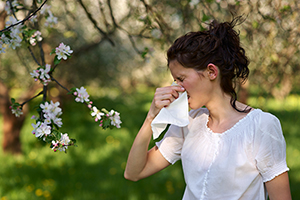



| By Dr. Ronald Hoffman
Congratulations, survivors of Winter 2016-17! It seems like it’s been an interminably cold spring, but you’ve made it. The Freeze has lifted, but wait! A new menace threatens—Spring Allermageddon!
 Spring blossoms will soon adorn our trees, and our cars and patios will be coated with a dusting of yellowish-green pollen. For spring allergy sufferers, that means itchy, burning red eyes, scratchy throats, sneezing, wheezing, coughing, and sinus congestion.
Spring blossoms will soon adorn our trees, and our cars and patios will be coated with a dusting of yellowish-green pollen. For spring allergy sufferers, that means itchy, burning red eyes, scratchy throats, sneezing, wheezing, coughing, and sinus congestion.
Prescription and over-the-counter medications can suppress symptoms temporarily, but side effects abound, and they don’t get to the root of the problem. Thankfully, there are plenty of natural remedies that can help.
Before I list my favorite natural products for allergy, a few general caveats:
PASS ON THE PIZZA: When pollen comes on like gangbusters, your allergy “cup” runneth over, so to speak. Low-grade chronic allergies to dairy and gluten, often quiescent during the deep-freeze, may contribute to overload when seasonal allergens make their appearance. Many of my patients report their allergy symptoms are better when they eliminate potential food allergens, and I find the same is true for me.
HOP ON THE WAGON: Beer, wine and liquor contain histamine, produced by yeast and bacteria during the fermentation process. If you’re going to imbibe, clear distilled alcohols such as vodka and gin seem better-tolerated, but only in moderation.
SKIP THE SUGAR: Sugar promotes yeast overgrowth, which triggers allergic symptoms.
AVOID HISTAMINE TRIGGERS: In addition to wine and beer, a host of foods boost histamine, resulting in histamine intolerance.
GET SOME (REALLY) FRESH AIR: No, not the outdoors kind. During the couple of weeks when spring pollens peak, cloister yourself inside with the air conditioner on (provided its mechanical innards are mold- and dust-free) and consider getting a HEPA filter for your bedroom to pull indoor allergens out of circulation. And make sure air fresheners and detergent and fabric softener fragrances aren’t adding to your nose woes. GIVE YOUR HOUSE A CHECKUP! Frequently, hidden source of mold, or VOCs from new carpets or furniture, can be allergy triggers.
BE BORN IN A MANGER: Maybe too late for you but interesting nonetheless: Studies show that kids who are born on farms and grow up playing in the dirt with animals have fewer allergies as they age.
AVOID ANTIBIOTICS: Studies show that frequent use in childhood ups the risk for asthma and other allergic disorders.
DRINK OOLONG TEA: I credit Dr. Leo Galland with this suggestion. He states that in laboratory studies, the catechins found in oolong tea were shown to inhibit allergic reactions.
TRY “IMMUNE BALANCE SOUP”: Another of Dr. Galland’s tips from his book The Allergy Solution. Sauté three cups of sliced carrots in three tablespoons of extra-virgin olive oil for 10 minutes. Add one cup of chopped parsley, two cups of chopped scallions (green parts only), 12 ounces of chopped broccoli, three ounces of chopped baby kale, one teaspoon of turmeric powder and one-quarter teaspoon of ground black pepper. Add salt to taste. Cook and stir for one minute. Add 12 cups of water, and bring to a boil. Cover and simmer for 20 minutes. Add one tablespoon of shredded daikon radish just before serving.
Now that we’ve gotten all of that squared away, here are my Top 18 Allergy-Fighting Products:
Get a jump on allergy season by starting supplementation early, before symptoms begin; stop the allergic cascade before it gets out of control. Here’s to a healthy, allergy-free spring!
Though we think of declining estrogen as the hallmark of menopause, it's actually common for…

Up to 12 percent of Americans have ulcers at some point in life. Peptic ulcers…
Gallbladder disease is a modern illness. An estimated 20 million Americans have gallbladder disease. The…

There’s more to GI health than whether or not to take an acid-blocker. All too…

In the latest attempt to remove “stigma” from medical terminology, liver specialists have come up…

Q: My husband’s high sensitivity C-reactive protein (hs-CRP) is 1.62 and his homocysteine is 13.1. If…

Banish the Bloat: Leyla Weighs In with Tips and Insights

Our virtual voicemail is open 24/7, so there's no need to wait to submit your questions for Dr. Hoffman. Leave a message, and you may hear your question featured on the Intelligent Medicine radio program!